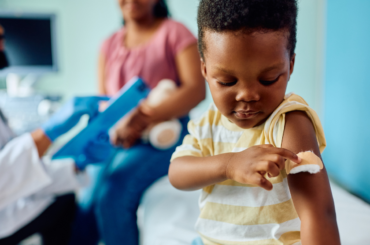ParentsTogether Research Reveals Families are Hesitant About Vaccinating Their Children Against COVID-19; Black Parents Say They Would Probably or Definitely Not Vaccinate Their Kids at Nearly Twice the Rate of Hispanic or White Parents
Study Finds Parental Attitudes for Child COVID-19 Vaccination Vary By Income and Race, Awareness of Others Being Vaccinated
WASHINGTON D.C. — According to a new study from ParentsTogether, a family advocacy group of more than 2.5 million parents across the country, parents are expressing early hesitancy around vaccinating their children against COVID-19, with stark discrepancies by race and income.
While 70% of parents in the survey said they would probably or definitely get vaccinated themselves (or that they have already been vaccinated), only 58% of caregivers said they would probably or definitely vaccinate their children once a COVID-19 vaccine is approved for use in children. In particular, parents of color reported vaccine hesitancy for their children at a far higher rate than white parents.
According to the survey results, Black parents are especially hesitant to vaccinate their children against COVID-19, with 26% of respondents saying they would “probably not” or “definitely not” vaccinate their children, nearly twice the rate of white parents (15%) or Hispanic parents (13%). Black and Hispanic families and caregivers are also 70% more likely to say they are “not sure” about vaccinating their children than white parents. Those with annual household income of under $35K are significantly more likely to say that they will “definitely not” or “probably not” vaccinate their children (23%) than those with incomes over $75K (8%).
Overall, the data show that a large amount of parents’ hesitancy is a result of uncertainty rather than outright opposition, highlighting the opportunity and need to engage parents with more information and education about the vaccine as parents consider whether they are likely to vaccinate their children (when COVID-19 vaccines are approved for use in minors under age 16).
ParentsTogether’s research comes as Pfizer and Moderna have begun testing the efficacy and safety of the COVID-19 vaccines on children. In order to achieve herd immunity from COVID-19, experts estimate between 70-90% of the total population needs to get vaccinated. An often-missed piece of the drive towards ending the pandemic is that children – who make up 22% of the American population – may be an important part of reaching herd immunity.
Read the full results of the survey HERE.
Specifically, ParentsTogether’s research found that:
- Black parents, in particular, are nearly twice as likely to say they will “probably not” or “definitely not” vaccinate their children, as white or Hispanic parents. 27% of Black respondents saying they would “probably not” or “definitely not” vaccinate their children, compared to 15% of white parents and 13% of Hispanic parents
- Black and Hispanic parents are 70% more likely to be “not sure” about vaccinating their children than white parents. 34% of Black and Hispanic parents say that they are unsure, compared to 20% of white parents and 17% of AAPI parents
- Controlling for racial factors, household income levels also significantly affect parents’ hesitancy to vaccinate their children, with lower income households less likely to vaccinate their children. As household income drops, there are significantly higher levels of vaccine hesitancy, particularly in households with income below $35,000. 23% of households under $35,000 say they will “probably not” or “definitely” not vaccinate their children, compared to 8% of households with income over $75,000
- Similarly, the data show that in households with income below $20,000, levels of uncertainty about vaccinating children are markedly higher than their higher-earning peers. 30% of households below $20,000 per year are not sure compared to 16% of households making over $150,000 feeling unsure
- In terms of parents who say they “definitely” or “probably” will vaccinate their children, those with annual household incomes greater than $75,000 are significantly more likely to say that they will vaccinate (73%), compared to those with incomes under $35,000 (only 47%)
The survey made clear that one of the most significant things public health advocates can do to encourage parents to vaccinate their children is to increase their awareness about people they know who have already been vaccinated. Knowing someone who has been vaccinated doubles the likelihood that a respondent will vaccinate their children and significantly decreases the uncertainty of vaccinating their children. Specifically, ParentsTogether found:
- 44% of parents who know someone who has been vaccinated say they definitely plan to vaccinate their children versus only 22% of parents who don’t know anyone
- 24% of parents who know someone say they are “not sure” about vaccinating their kids versus 40% or parents who don’t know someone feeling unsure
- Controlling for race and income, of those who say they are inclined to vaccinate their children, knowing someone who has been vaccinated increases the likelihood a parent responds that they will probably or definitely vaccinate their children from 51% to 74% – an almost 50% increase in vaccine acceptance.
ParentsTogether found a range of reasons for parents hesitancy to vaccinate their children, but identified four key themes including:
- Concerns about short-term side effects
- Concerns about unknown long-term side-effects
- The speed of the vaccine’s development
- Lack of opportunity for long-term studies / wanting to wait for more data
ParentsTogether’s research suggests that there are four key ways to promote COVID-19 vaccinations efforts, including:
- Leveraging peer-to-peer influence campaigns. The more that parents see others who have received the vaccine safely, the more likely they are to plan to vaccinate their children. Other research has highlighted Americans’ hesitancy to be one of the first to receive the vaccine, and respondents in this survey expressed an even greater need to see clear evidence of safety before vaccinating kids.
- Focusing on education that empathizes with parents’ desire to protect their children. The general reticence to the vaccine many parents hold is largely borne out of the unknown and out of a desire to protect their children. Given their uncertainty and their desire to know more, it is essential that parents are engaged directly, proactively, and compassionately with answers to their legitimate questions.
- Make deep investments in reaching communities of color. COVID-19 vaccination promotion campaigns must be mindful of the higher levels of hesitancy in BIPOC communities regarding vaccines, as well as the historical and present-day roots of those legitimate concerns. Even as vaccine approval advances at a rapid pace, advocates must continue to call for ongoing, racially diverse clinical trials in order to address the concerns of diverse groups of parents, and public education and outreach efforts must leverage trusted voices from within communities with high rates of vaccine hesitancy.
- Planning for long-term outreach. Due to the speed of vaccine development and lack of longitudinal data, it’s likely that many parents may decide to “wait and see” before vaccinating their children. As a result, advocates should think about vaccination campaigns as an ongoing and long-term need that will require consistent communication and ongoing education with continual evidence and data around the vaccine’s impact on children.
“Children have been so hard hit by the disruptions of the pandemic, but they haven’t been part of the conversation yet around vaccines. As clinical trials for childhood vaccinations begin, parents are starting to form opinions about whether they will vaccinate their children against COVID-19,” said Bethany Robertson, co-founder and co-director of ParentsTogether. “We have to make sure that the pandemic’s unequal impact on communities of color and low-income families doesn’t get repeated when it comes to vaccinating children against COVID-19. We’re already seeing that parents of color, especially Black parents, are more vaccine hesitant, given legitimate historical and present-day concerns. We need to start the conversation with parents now, to build trust and understanding about how getting kids vaccinated against COVID-19 protects their health, their family’s health, and the health of our communities.”
# # #
ParentsTogether is a national, parent-led organization with over 2.5 million community members from coast to coast working together to build a world where every child and family can thrive. Our membership is socio-economically and racially diverse, and includes parents from every state







